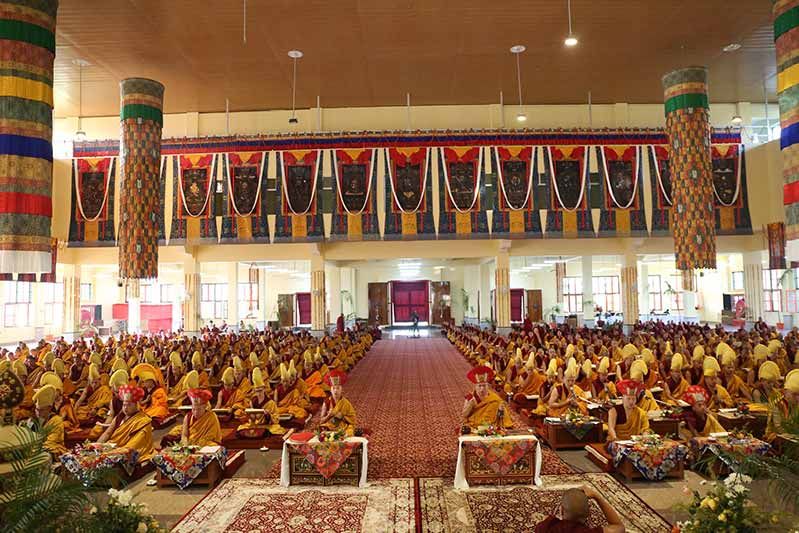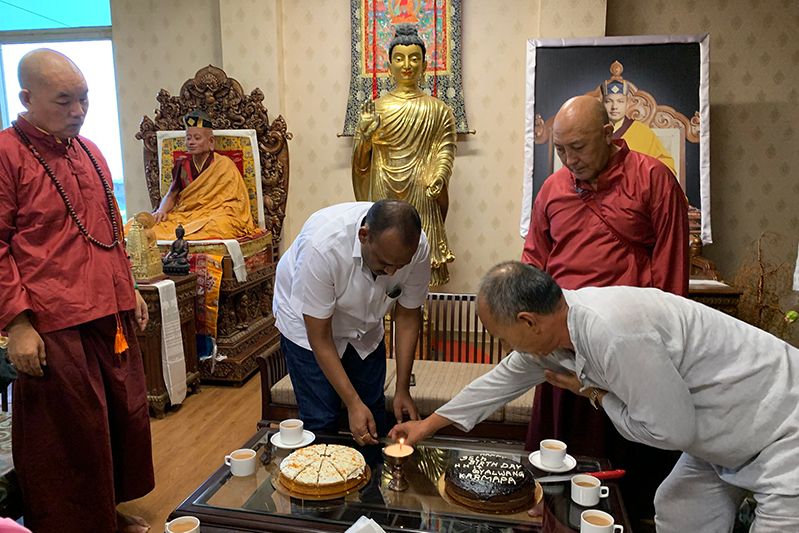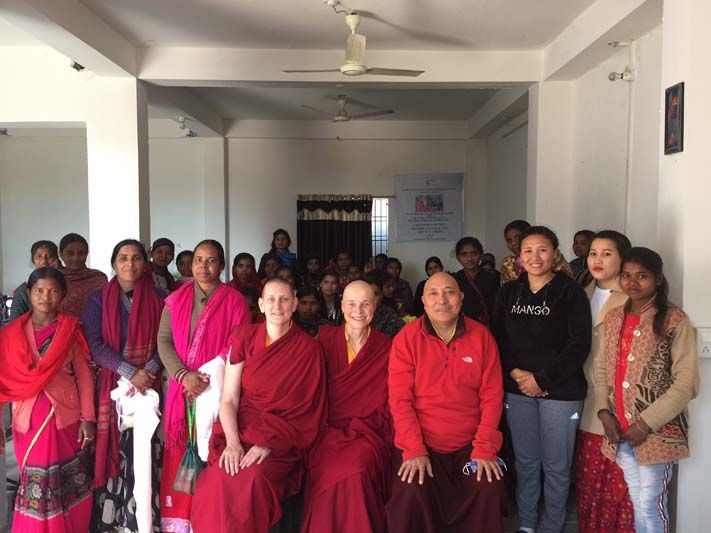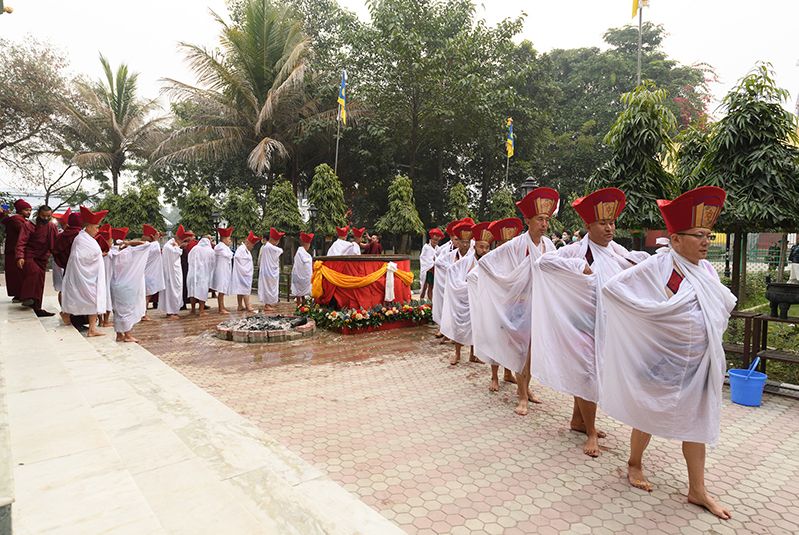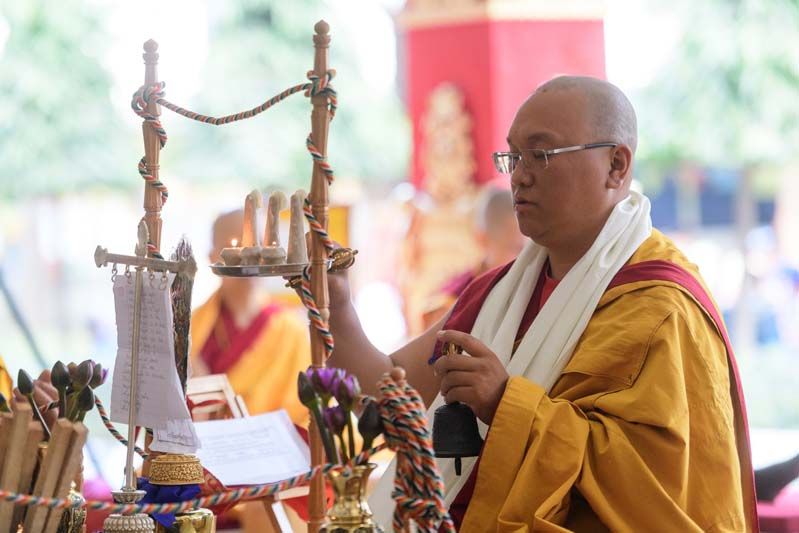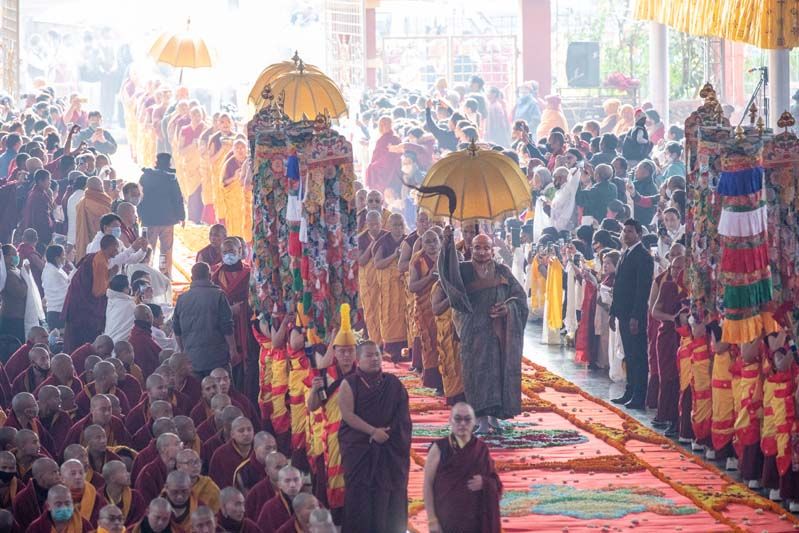The Reasons for Participating in the Monlam
- December 21, 2007
December 21, 2007, Translated by Ringu Tulku Rinpoche & Karma Choephel
There are many of us, representing many different Dharma traditions, gathered here for this monlam beneath the Bodhi Tree. This monlam of the Practice Lineage of unexcelled Dakpo and Shangpa Kagyu was established by Kyabje Kalu Rinpoche. Subsequently Kyabje Bokar Rinpoche took it on out of his compassion, and this is the twenty-fifth time we have been able to hold the Monlam.
If we talk about it in terms of the Kagyu lineage, although we may not see a great result from the Monlam, it has been quite a good achievement. The ultimate result would be all sentient beings easily attaining the omniscient state of Buddhahood. You could call this the activity or the aim of this lineage. If we think in these terms, holding the Monlam is not something that reaches the ultimate result. However, I regard it as a big step toward world peace, harmony, and happiness, so for us to gather here is great good fortune. It is difficult to say whether we will have the good fortune to gather here again. It is rare to have the opportunity to gather at the stupa in Bodhgaya in the shade of the Bodhi Tree. In times of good fortune, we need to understand that they are good fortune, and it is extremely important that we practice so that whatever virtue we gather is not mixed with selfish pride and arrogance.
In particular, we hold this monlam at the end of each year, and many people come here from many countries to participate. Over the course of a year, we all do many misdeeds, and we also do many virtuous acts. So at the end of the year we gather in this sacred place and with sincere and heartfelt regret confess whatever misdeeds we have done. If we feel that we have not performed enough virtue, we can round it out by doing more. I think this is a good opportunity for us to wrap up all of the merit we have gathered and misdeeds we have purified over the course of one year.
If we do not confess all of the year’s misdeeds promptly and instead just carelessly ignore them, we will carry them around year after year after year until we have accumulated a huge pile of misdeeds. We must not do that. We have a good opportunity now, so at this time we should confess all the misdeeds we have done during the year, whether we have transgressed the precepts of our vows or committed any other act of wrongdoing. If we confess these strongly and sincerely from our hearts here in this sacred place where our Teacher Shakyamuni awakened to complete and perfect enlightenment, I think it will be unusually powerful.
Similarly, this is a wonderful place for us to do virtuous acts and gather merit. A large number of sangha members of many different traditions have assembled here, so if you want to make an offering to the lamas or the sangha, there are people to offer to. Likewise, many poor beggars from different regions have come here and are gathered around the outside of the stupa. Thus if you want to be generous to the downtrodden, there are people to be generous to. All the different types of people to whom you can make offerings or be generous have come together here, which makes this an excellent place to accumulate merit. All the conditions are right.
It is not absolutely necessary to accumulate merit through your external actions of body and speech. However, the more your merit is reflected in the way you relate to people with your body and speech, the greater an impression it makes upon your being. I think it is very beneficial if your virtuous actions are not just seeds in your mind but become actions of your body and speech.
There are many sangha members gathered here. Many of us here live under monastic discipline. There are probably also many here who do not live under monastic discipline but just wear the Buddhist robes. The reason we all have put on red robes and come together here comes down to seeing that there are a lot of benefits to wearing the red robes.
When we gather here, it is not impermissible to think about food and clothing—we do need to think about them. However, food and clothing are a minor and temporary part of this life. For example, if we have one day’s food, that will fill our stomachs for one day, but it will not help us in any way the next day. Food and clothing give us merely fleeting happiness; they cannot give us the ultimate happiness. If we can bring ourselves a greater happiness that is one hundred times stronger than that fleeting happiness, that is even more beneficial. If we think in terms of benefit, there is a greater happiness, such as that of our future lives.
Whether we believe in future lives or not, we cannot definitely say they do not exist. Therefore, we need to consider our future lives carefully in case they do exist. Otherwise, if we continue as we have been doing, we do not know where we will end up in our next life. This is why we need to start now to continually prepare ourselves for all our future lives.
We have gathered in this sacred place and have this opportunity to hold what we call a monlam. We are reciting many of the words of the Buddha and prayers composed by the earlier masters. We should do this in a frame of mind that is unlike our ordinary mind. As much as possible, we should have the kindest and best of motivations. Ordinarily we might feel some anger, pride, or jealousy. There is not much to do about this; ordinary individuals are unable to always be good. But it would be a mistake just to completely give up. We need to give our virtuous, positive side more chances so that it will triumph and give our unvirtuous, negative side fewer chances so that it will be defeated. This is where we need to concentrate our forces.
We have gathered here to do that. If we are looking for benefit, there has been benefit. But it is not just that. We are thinking about bringing benefit to all sentient beings, helping them, and freeing them. We are thinking about world peace and happiness. It should not be necessary to say how wonderful it is for us to develop bodhichitta like all the buddhas and bodhisattvas, who developed bodhichitta for the benefit of all innumerable sentient beings and engaged in vast actions.
When we sangha members are following monastic discipline or the discipline of the Kagyu Monlam, it might seem like there are many things we have to pay attention to. But the main thing it comes down to is whether we have really thought about what we are doing. If we have not, then even the smallest thing to do seems huge. But if we have really thought it through, even doing hundreds of things seems insignificant. But here we have many rules for you to follow, and there are many discipline masters here. When the discipline master is looking, you sit up straight; when he looks away, you slouch. When the discipline master turns to face in another direction, it is not OK for you to think about something else that you might need to do. The discipline masters are there to remind you to do what you are supposed to be doing. Actually, it would be better if we did not need discipline masters and our minds were naturally peaceful and tame. Achieving your own outer and inner happiness is for your own benefit, and the least we can do is tell you that. It is not enough just to say it: we need to explain it regularly. That is why we have explained and taught it everywhere, although it seems there are some people who, because of the language barrier, could not understand.
In any case, no matter how bad off we are, we have attained a human body. We have heard the sound of the Dharma and the words “the Three Jewels.” This is the kind of human body we have attained. From time to time the Dharma comes to mind. From time to time, bodhichitta and helping others come to mind. There will be differences in how clear, vast, profound, or genuine our focus is, but there are not many beginners who are immediately complete and perfect. That is not even necessary. If we were immediately spontaneously perfect, we would immediately completely realize the path and attain the omniscient state of a Buddha. That would be thinking too much of ourselves. We do not need to do that. What we have to think about is how much we can purify our thoughts.
I spoke about this the other day. When we are reciting prayers, our mouths and our minds need to work together. If we are saying “Buddha” with our mouths but inside have been taken over by a demon, that is not OK. When we say the word “Buddha,” inside ourselves we should think about a Buddha, even if all we can remember is someone sitting there with an ushnisha on his head and all the other marks and signs of a Buddha. There would be nothing wrong with that.
When we say “Dharma,” we can think of it in many ways. It is like when we talk about love and compassion, for example. When we were children, we did not know anything about love and compassion being the wish that others be happy and free from suffering—we were just kids. But our parents would say that love and compassion are important, and so we got the idea they somehow are important. If someone laughed, we would think, “Oh, that’s love and compassion.” Or if we were given a present, we would think, “That person is really loving and compassionate.” People sometimes feel that way. If at the very least you can think about it like this, that is fine. It’s better than nothing at all.
Words such as “Buddha,” “Dharma,” and “mother sentient beings throughout space” are the most impressive and eloquent of words, the finest of fine words composed by the lamas and great masters of the past. It is easy to recite such words with our mouths. But if our thoughts inside get worse and worse and we are sitting there wallowing in negativity, that is completely contradictory. We would not be holding the Kagyu Monlam; we would be holding the Negativity Monlam. We would not be gathering merit—we would be sitting here gathering negativity. There is no point in doing that. Have higher expectations of yourself. Trust yourself more. Do not deceive yourself. Even if you are unable to actually help other sentient beings, I think it would be good if at the very least you were not fooling them. It is important for you all to keep this in mind.
Each person has his or her own window onto the world of appearances. When we peer through the window, we each see the world in our own way. We see our own picture or movie. Therefore we should practice in a way that is in tune with these appearances and investigates them. Since appearances are impermanent, we should meditate on impermanence. Since appearances are deluded, we should meditate on how they are illusory. In relative appearances we need to be able to evaluate whether we should do something or not, so we need to know what to take up and what to give up. For this reason, please study and contemplate correctly. Then follow through on it. That is very important.
Mornings, we take the Mahayana sojong vows. In the past, this was something for the bhikshus and bhikshunis to do, but many others have also joined in. It probably would be good for you all to know, now that you have taken the Mahayana sojong vows, what precepts you need to follow from now until sunrise tomorrow. Do not think that it is just a matter of not eating supper! If you think that it is only about not eating supper and that there are no other precepts, that is be a problem. The precepts you repeat after me are not something you merely ought to hold. If you take the vows, you must follow the precepts. It is important to follow them. I think it would be good if I explained the precepts later. It is not good for you not to know what precepts to hold. If in the next few days I have the chance to tell you what actions you should refrain from and what actions you should do, I will explain them.
It is because of the support of donations in behalf of the living and the deceased that we are able to hold this Kagyu Monlam. Support for the Monlam does not fall from the sky or grow from the ground. Donations for the living and the deceased are a major source of support. We need to think about these donations. This is not just for monks and nuns—the householders need to think about them, too. We are all eating Kagyu Monlam bread and drinking Kagyu Monlam tea. What we are enjoying are things given by living people whose eyes are still open and whose bodies are made of flesh and blood. We really have to keep this in mind. Sometimes it is hard for all of us as individuals to save even ten or twenty rupees. But a lot of money is spent for the Monlam without a second thought. This is not to make the Monlam planners famous or popular. There are two important reasons to have the Monlam.
One reason to have the Monlam is that by gathering here in the sacred place of Bodhgaya, where our Teacher attained complete and perfect awakening, we can remember our Teacher’s deeds. A single hunter can kill many animals in one day, and some areas or mountains have almost no animals left. Fishermen go out in technologically advanced fishing boats and can put out their nets and catch many tens of thousands of fish at a time. In many areas, the fish are being wiped out. It is similar with butchers. In olden times, the best of butchers could kill perhaps a hundred animals in one day. Nowadays, because of technology, they can kill hundreds of beings in just a few minutes. The earth’s inherent nature is such that it could be sustained for a very long time, but the negative actions and karma of sentient beings are so powerful that there is a danger that life on earth will not be sustainable for much longer. If the earth is destroyed, there will be no Dharma, no earth, or anything at all left. We need to consider this carefully.
Some people say, “Everything is impermanent; everything changes. All that is left from earlier times are just the ruins.” They say this, that, and so many other things that their voices make quite a racket. They probably think they have realized impermanence. But this is not quite right. Changes of times and changes in the world are not the same. Times may change, and there may be little left of earlier times other than their ruins, but we can still tell stories about earlier times. We still tell their history, saying this happened or that happened. But if the world itself is destroyed, who will tell our story? Who will tell world history? Who will know what happened in the past? If the world is destroyed, we will lose the chance that our stories might be told. Even our names will be gone.
These days there is a lot of discussion about global warming. Some people seem to be unable to hear it; some people are able to hear it and are paying attention. But whether we know it or not, if we just look at the physical situation, the world is getting warmer. In Tibet, the primordial glaciers are melting, and there is not much of them left any more. We always talk about the snow mountains of Tibet, but these days there are just dark rocks; there is no longer any snow to be seen. When these are all gone, there will be a great danger for the humans and all the creatures who live on the shores of the world’s oceans. How many people died in the tsunami a few years ago? It is not impossible that an even stronger and more terrible one might happen in the future. When that happens, it will not help to say, “What did we do?” We have already had warnings this would happen. We are all the same in wanting to be happy and free of suffering. Knowing that such a danger is coming but nevertheless turning our backs on it is wrong. It is carelessness and a lack of mindfulness and awareness. Our selfish pride and attention to our own wants is like poisonous food. If we can develop our altruistic thoughts, then I think that participating in the Kagyu Monlam will have been meaningful.
December 21, 2007, Translated by Ringu Tulku Rinpoche & Karma Choephel
There are many of us, representing many different Dharma traditions, gathered here for this monlam beneath the Bodhi Tree. This monlam of the Practice Lineage of unexcelled Dakpo and Shangpa Kagyu was established by Kyabje Kalu Rinpoche. Subsequently Kyabje Bokar Rinpoche took it on out of his compassion, and this is the twenty-fifth time we have been able to hold the Monlam.
If we talk about it in terms of the Kagyu lineage, although we may not see a great result from the Monlam, it has been quite a good achievement. The ultimate result would be all sentient beings easily attaining the omniscient state of Buddhahood. You could call this the activity or the aim of this lineage. If we think in these terms, holding the Monlam is not something that reaches the ultimate result. However, I regard it as a big step toward world peace, harmony, and happiness, so for us to gather here is great good fortune. It is difficult to say whether we will have the good fortune to gather here again. It is rare to have the opportunity to gather at the stupa in Bodhgaya in the shade of the Bodhi Tree. In times of good fortune, we need to understand that they are good fortune, and it is extremely important that we practice so that whatever virtue we gather is not mixed with selfish pride and arrogance.
In particular, we hold this monlam at the end of each year, and many people come here from many countries to participate. Over the course of a year, we all do many misdeeds, and we also do many virtuous acts. So at the end of the year we gather in this sacred place and with sincere and heartfelt regret confess whatever misdeeds we have done. If we feel that we have not performed enough virtue, we can round it out by doing more. I think this is a good opportunity for us to wrap up all of the merit we have gathered and misdeeds we have purified over the course of one year.
If we do not confess all of the year’s misdeeds promptly and instead just carelessly ignore them, we will carry them around year after year after year until we have accumulated a huge pile of misdeeds. We must not do that. We have a good opportunity now, so at this time we should confess all the misdeeds we have done during the year, whether we have transgressed the precepts of our vows or committed any other act of wrongdoing. If we confess these strongly and sincerely from our hearts here in this sacred place where our Teacher Shakyamuni awakened to complete and perfect enlightenment, I think it will be unusually powerful.
Similarly, this is a wonderful place for us to do virtuous acts and gather merit. A large number of sangha members of many different traditions have assembled here, so if you want to make an offering to the lamas or the sangha, there are people to offer to. Likewise, many poor beggars from different regions have come here and are gathered around the outside of the stupa. Thus if you want to be generous to the downtrodden, there are people to be generous to. All the different types of people to whom you can make offerings or be generous have come together here, which makes this an excellent place to accumulate merit. All the conditions are right.
It is not absolutely necessary to accumulate merit through your external actions of body and speech. However, the more your merit is reflected in the way you relate to people with your body and speech, the greater an impression it makes upon your being. I think it is very beneficial if your virtuous actions are not just seeds in your mind but become actions of your body and speech.
There are many sangha members gathered here. Many of us here live under monastic discipline. There are probably also many here who do not live under monastic discipline but just wear the Buddhist robes. The reason we all have put on red robes and come together here comes down to seeing that there are a lot of benefits to wearing the red robes.
When we gather here, it is not impermissible to think about food and clothing—we do need to think about them. However, food and clothing are a minor and temporary part of this life. For example, if we have one day’s food, that will fill our stomachs for one day, but it will not help us in any way the next day. Food and clothing give us merely fleeting happiness; they cannot give us the ultimate happiness. If we can bring ourselves a greater happiness that is one hundred times stronger than that fleeting happiness, that is even more beneficial. If we think in terms of benefit, there is a greater happiness, such as that of our future lives.
Whether we believe in future lives or not, we cannot definitely say they do not exist. Therefore, we need to consider our future lives carefully in case they do exist. Otherwise, if we continue as we have been doing, we do not know where we will end up in our next life. This is why we need to start now to continually prepare ourselves for all our future lives.
We have gathered in this sacred place and have this opportunity to hold what we call a monlam. We are reciting many of the words of the Buddha and prayers composed by the earlier masters. We should do this in a frame of mind that is unlike our ordinary mind. As much as possible, we should have the kindest and best of motivations. Ordinarily we might feel some anger, pride, or jealousy. There is not much to do about this; ordinary individuals are unable to always be good. But it would be a mistake just to completely give up. We need to give our virtuous, positive side more chances so that it will triumph and give our unvirtuous, negative side fewer chances so that it will be defeated. This is where we need to concentrate our forces.
We have gathered here to do that. If we are looking for benefit, there has been benefit. But it is not just that. We are thinking about bringing benefit to all sentient beings, helping them, and freeing them. We are thinking about world peace and happiness. It should not be necessary to say how wonderful it is for us to develop bodhichitta like all the buddhas and bodhisattvas, who developed bodhichitta for the benefit of all innumerable sentient beings and engaged in vast actions.
When we sangha members are following monastic discipline or the discipline of the Kagyu Monlam, it might seem like there are many things we have to pay attention to. But the main thing it comes down to is whether we have really thought about what we are doing. If we have not, then even the smallest thing to do seems huge. But if we have really thought it through, even doing hundreds of things seems insignificant. But here we have many rules for you to follow, and there are many discipline masters here. When the discipline master is looking, you sit up straight; when he looks away, you slouch. When the discipline master turns to face in another direction, it is not OK for you to think about something else that you might need to do. The discipline masters are there to remind you to do what you are supposed to be doing. Actually, it would be better if we did not need discipline masters and our minds were naturally peaceful and tame. Achieving your own outer and inner happiness is for your own benefit, and the least we can do is tell you that. It is not enough just to say it: we need to explain it regularly. That is why we have explained and taught it everywhere, although it seems there are some people who, because of the language barrier, could not understand.
In any case, no matter how bad off we are, we have attained a human body. We have heard the sound of the Dharma and the words “the Three Jewels.” This is the kind of human body we have attained. From time to time the Dharma comes to mind. From time to time, bodhichitta and helping others come to mind. There will be differences in how clear, vast, profound, or genuine our focus is, but there are not many beginners who are immediately complete and perfect. That is not even necessary. If we were immediately spontaneously perfect, we would immediately completely realize the path and attain the omniscient state of a Buddha. That would be thinking too much of ourselves. We do not need to do that. What we have to think about is how much we can purify our thoughts.
I spoke about this the other day. When we are reciting prayers, our mouths and our minds need to work together. If we are saying “Buddha” with our mouths but inside have been taken over by a demon, that is not OK. When we say the word “Buddha,” inside ourselves we should think about a Buddha, even if all we can remember is someone sitting there with an ushnisha on his head and all the other marks and signs of a Buddha. There would be nothing wrong with that.
When we say “Dharma,” we can think of it in many ways. It is like when we talk about love and compassion, for example. When we were children, we did not know anything about love and compassion being the wish that others be happy and free from suffering—we were just kids. But our parents would say that love and compassion are important, and so we got the idea they somehow are important. If someone laughed, we would think, “Oh, that’s love and compassion.” Or if we were given a present, we would think, “That person is really loving and compassionate.” People sometimes feel that way. If at the very least you can think about it like this, that is fine. It’s better than nothing at all.
Words such as “Buddha,” “Dharma,” and “mother sentient beings throughout space” are the most impressive and eloquent of words, the finest of fine words composed by the lamas and great masters of the past. It is easy to recite such words with our mouths. But if our thoughts inside get worse and worse and we are sitting there wallowing in negativity, that is completely contradictory. We would not be holding the Kagyu Monlam; we would be holding the Negativity Monlam. We would not be gathering merit—we would be sitting here gathering negativity. There is no point in doing that. Have higher expectations of yourself. Trust yourself more. Do not deceive yourself. Even if you are unable to actually help other sentient beings, I think it would be good if at the very least you were not fooling them. It is important for you all to keep this in mind.
Each person has his or her own window onto the world of appearances. When we peer through the window, we each see the world in our own way. We see our own picture or movie. Therefore we should practice in a way that is in tune with these appearances and investigates them. Since appearances are impermanent, we should meditate on impermanence. Since appearances are deluded, we should meditate on how they are illusory. In relative appearances we need to be able to evaluate whether we should do something or not, so we need to know what to take up and what to give up. For this reason, please study and contemplate correctly. Then follow through on it. That is very important.
Mornings, we take the Mahayana sojong vows. In the past, this was something for the bhikshus and bhikshunis to do, but many others have also joined in. It probably would be good for you all to know, now that you have taken the Mahayana sojong vows, what precepts you need to follow from now until sunrise tomorrow. Do not think that it is just a matter of not eating supper! If you think that it is only about not eating supper and that there are no other precepts, that is be a problem. The precepts you repeat after me are not something you merely ought to hold. If you take the vows, you must follow the precepts. It is important to follow them. I think it would be good if I explained the precepts later. It is not good for you not to know what precepts to hold. If in the next few days I have the chance to tell you what actions you should refrain from and what actions you should do, I will explain them.
It is because of the support of donations in behalf of the living and the deceased that we are able to hold this Kagyu Monlam. Support for the Monlam does not fall from the sky or grow from the ground. Donations for the living and the deceased are a major source of support. We need to think about these donations. This is not just for monks and nuns—the householders need to think about them, too. We are all eating Kagyu Monlam bread and drinking Kagyu Monlam tea. What we are enjoying are things given by living people whose eyes are still open and whose bodies are made of flesh and blood. We really have to keep this in mind. Sometimes it is hard for all of us as individuals to save even ten or twenty rupees. But a lot of money is spent for the Monlam without a second thought. This is not to make the Monlam planners famous or popular. There are two important reasons to have the Monlam.
One reason to have the Monlam is that by gathering here in the sacred place of Bodhgaya, where our Teacher attained complete and perfect awakening, we can remember our Teacher’s deeds. A single hunter can kill many animals in one day, and some areas or mountains have almost no animals left. Fishermen go out in technologically advanced fishing boats and can put out their nets and catch many tens of thousands of fish at a time. In many areas, the fish are being wiped out. It is similar with butchers. In olden times, the best of butchers could kill perhaps a hundred animals in one day. Nowadays, because of technology, they can kill hundreds of beings in just a few minutes. The earth’s inherent nature is such that it could be sustained for a very long time, but the negative actions and karma of sentient beings are so powerful that there is a danger that life on earth will not be sustainable for much longer. If the earth is destroyed, there will be no Dharma, no earth, or anything at all left. We need to consider this carefully.
Some people say, “Everything is impermanent; everything changes. All that is left from earlier times are just the ruins.” They say this, that, and so many other things that their voices make quite a racket. They probably think they have realized impermanence. But this is not quite right. Changes of times and changes in the world are not the same. Times may change, and there may be little left of earlier times other than their ruins, but we can still tell stories about earlier times. We still tell their history, saying this happened or that happened. But if the world itself is destroyed, who will tell our story? Who will tell world history? Who will know what happened in the past? If the world is destroyed, we will lose the chance that our stories might be told. Even our names will be gone.
These days there is a lot of discussion about global warming. Some people seem to be unable to hear it; some people are able to hear it and are paying attention. But whether we know it or not, if we just look at the physical situation, the world is getting warmer. In Tibet, the primordial glaciers are melting, and there is not much of them left any more. We always talk about the snow mountains of Tibet, but these days there are just dark rocks; there is no longer any snow to be seen. When these are all gone, there will be a great danger for the humans and all the creatures who live on the shores of the world’s oceans. How many people died in the tsunami a few years ago? It is not impossible that an even stronger and more terrible one might happen in the future. When that happens, it will not help to say, “What did we do?” We have already had warnings this would happen. We are all the same in wanting to be happy and free of suffering. Knowing that such a danger is coming but nevertheless turning our backs on it is wrong. It is carelessness and a lack of mindfulness and awareness. Our selfish pride and attention to our own wants is like poisonous food. If we can develop our altruistic thoughts, then I think that participating in the Kagyu Monlam will have been meaningful.
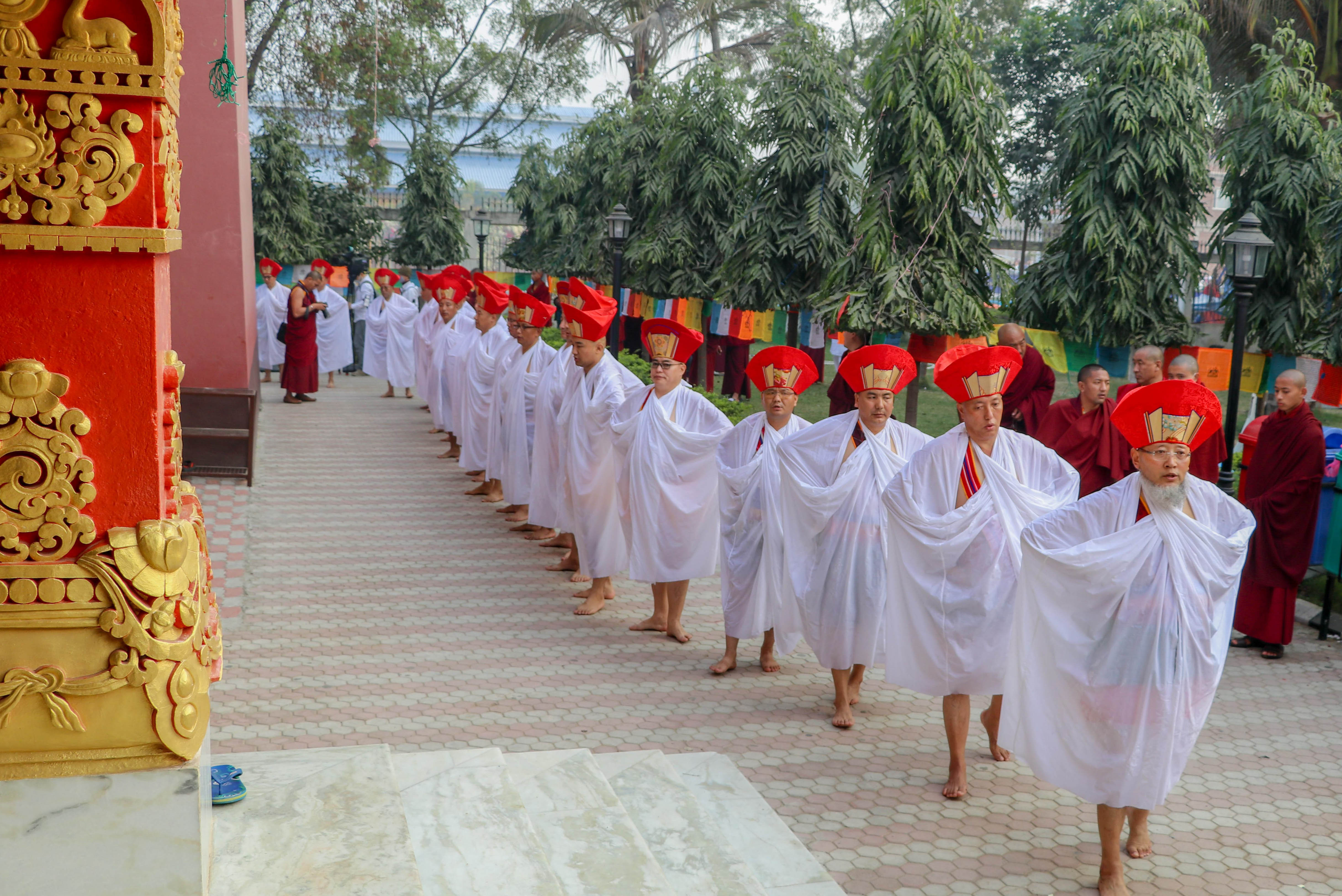
37th Kagyu Monlam Schedule
Tibetan / English / Chinese • French • German • Indonesian • Korean • Polish • Russian • Spanish • Vietnamese
Dharma Teachings
 Meditation Instructions
Meditation Instructions
Recorded during the 37th Kagyu Monlam, Bodhgaya, India. January 28-30, 2020.
